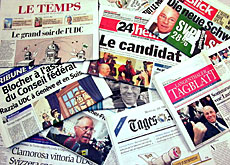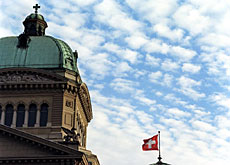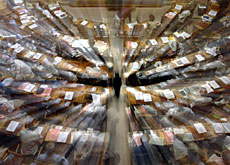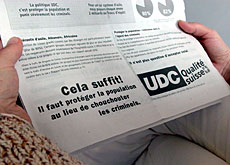Press predict end of “Magic Formula”

The resounding success of the rightwing Swiss People’s Party in Sunday’s elections has sounded the death knell for the current consensus system of government, say the country’s media.
According to much of the press, the People’s Party has a legitimate right to seek a second cabinet seat.
Under a power-sharing arrangement – known as the “Magic Formula” – in place since 1959, cabinet seats are shared out between Switzerland’s four main parties.
The Christian Democratic, Social Democratic and Radical parties each have two seats in the seven-member cabinet, while the Swiss People’s Party only has one.
The French-language “Le Temps” newspaper said on Monday that the Magic Formula had taken “a direct hit”.
An overhaul of one of the sacred cows of Swiss politics was no longer unthinkable, added the “Neue Zürcher Zeitung”.
Not so magic
On Sunday the People’s Party demanded that it be granted a second seat at the expense of one of the other parties to reflect its new status as the strongest political force in Switzerland.
Final results in the parliamentary elections show the People’s Party gained an additional 11 seats in the 200-member House of Representatives, taking its total to 55.
The party’s share of the popular vote increased to 26.6 per cent, up four per cent from 1999.
Its closest rivals are the centre-left Social Democrats, who have 52 seats, while the centre-right Radical and Christian Democratic parties lost 14 seats between them.
“It is no longer possible for the parties to avoid reality,” commented Le Temps. “Who must go and who must stay in the government will be debated over the coming weeks.”
Maintaining consensus in government would inevitably mean granting the People’s Party a second seat at the expense of the Christian Democrats, commented Zurich’s “Tages-Anzeiger”.
Bern’s “Bund” newspaper said this could mean parliament “sacrificing [Christian Democrat cabinet representatives] Joseph Deiss or Ruth Metzler.”
Britain’s “Financial Times” agreed that victory for the People’s Party threatened to tip the balance of power.
Newspapers in Italian-speaking Switzerland were agreed that the rightwing win had challenged political stability here.
The “Giornale del Popolo” said the “Magic Formula will remain for the time being, but will not be an adequate governing solution in future.”
Pressure
The French-language “Tribune de Genève” scolded the People’s Party for threatening to withdraw Samuel Schmid from the cabinet unless industrialist Christoph Blocher was given a second cabinet seat.
It said the move went against the normal practice of “considering several candidates that have been presented to parliament once an election is over”.
The Radicals and Christian Democrats must resist the pressure brought to bear by Blocher’s party, commented the “Nouvelliste”.
“It is high time that they prepare the way for big centrist parties that can serve as a counterweight to the polarisation of parliament,” the canton Valais paper wrote.
The cabinet elections are due to take place on December 10.
“The People’s Party has become a real national party following its success in French-speaking Switzerland,” wrote the Lausanne-based “24 Heures”.
Final results in the parliamentary elections show the People’s Party made significant inroads into western Switzerland, even winning two seats in the Centre-left stronghold of Geneva.
However, it failed to pull in the votes in Italian-speaking Switzerland, where the Radicals gained a seat.
swissinfo, Samantha Tonkin
Final results show the Swiss People’s Party has won an additional 11 seats in the House of Representatives, taking its total to 55.
The Social Democrats gained one extra seat, raising their total to 52.
The Christian Democratic and Radical parties lost seven seats each.
The Green Party gained four seats in the House of Representatives.
Around 4.7 million people were eligible to vote in Switzerland.
Turnout was at 45.6 per cent, up from 43.3 per cent in the 1999 elections.
Cabinet seats in Switzerland are shared out among the four main parties, under a power sharing arrangement dating back to 1959.
The rightwing People’s Party has one cabinet seat to the others’ two because until eight years ago it was the smallest of the four in parliament.
Now it is demanding a second seat, and is threatening to go into opposition unless it gets one at the December 10 cabinet elections.
The Centre-right Christian Democrats are the most likely to lose one of their cabinet seats, after polling just 14.4% of the vote compared with over 26.6% for the People’s Party.

In compliance with the JTI standards
More: SWI swissinfo.ch certified by the Journalism Trust Initiative



You can find an overview of ongoing debates with our journalists here . Please join us!
If you want to start a conversation about a topic raised in this article or want to report factual errors, email us at english@swissinfo.ch.